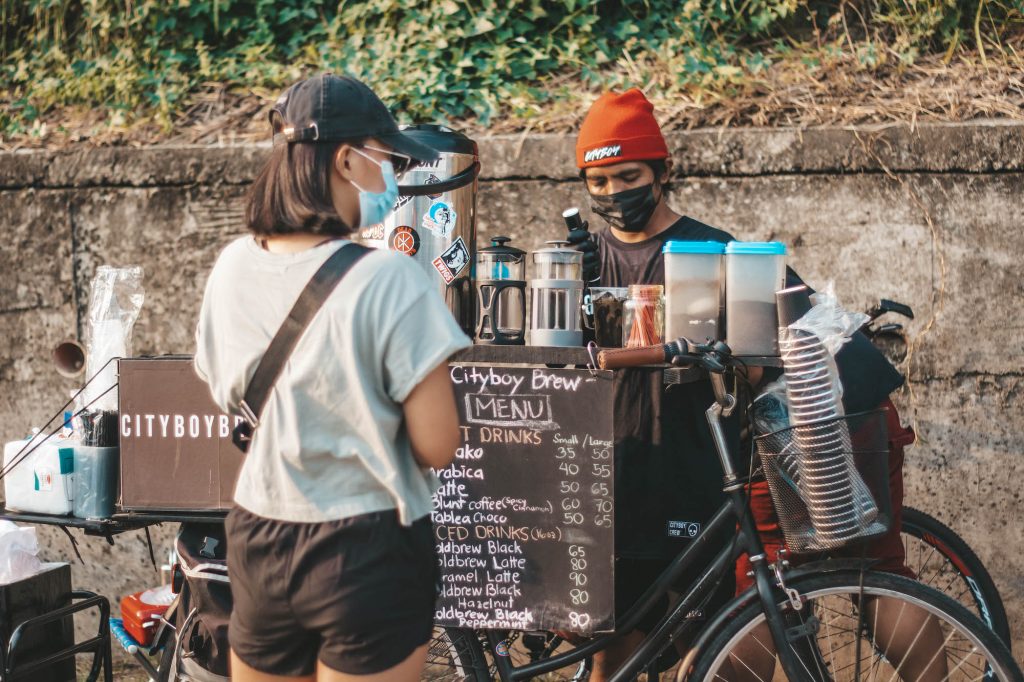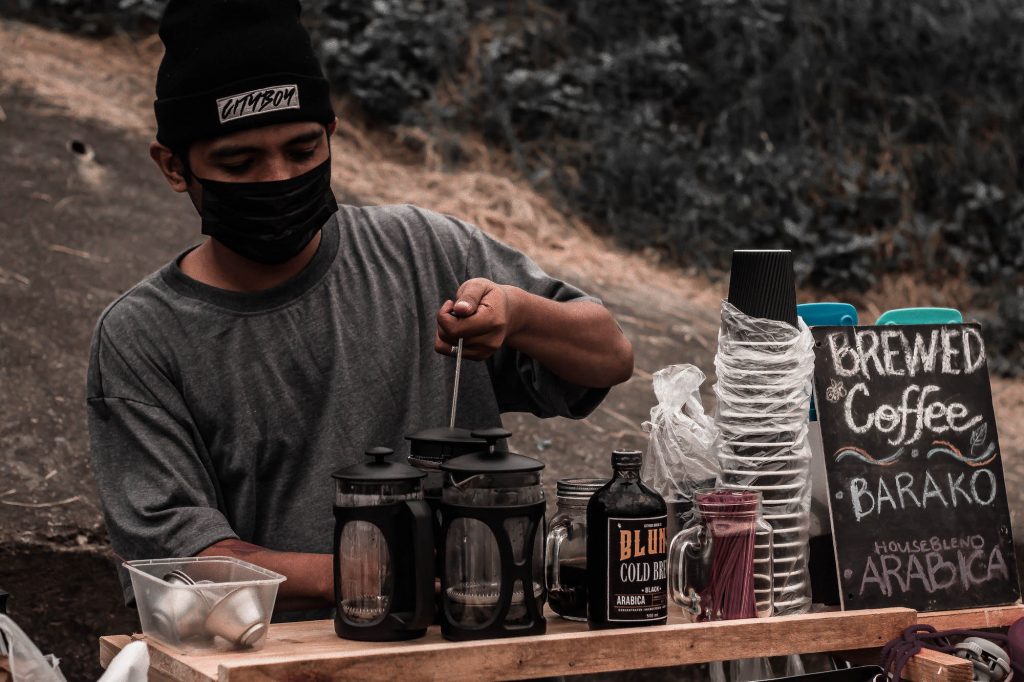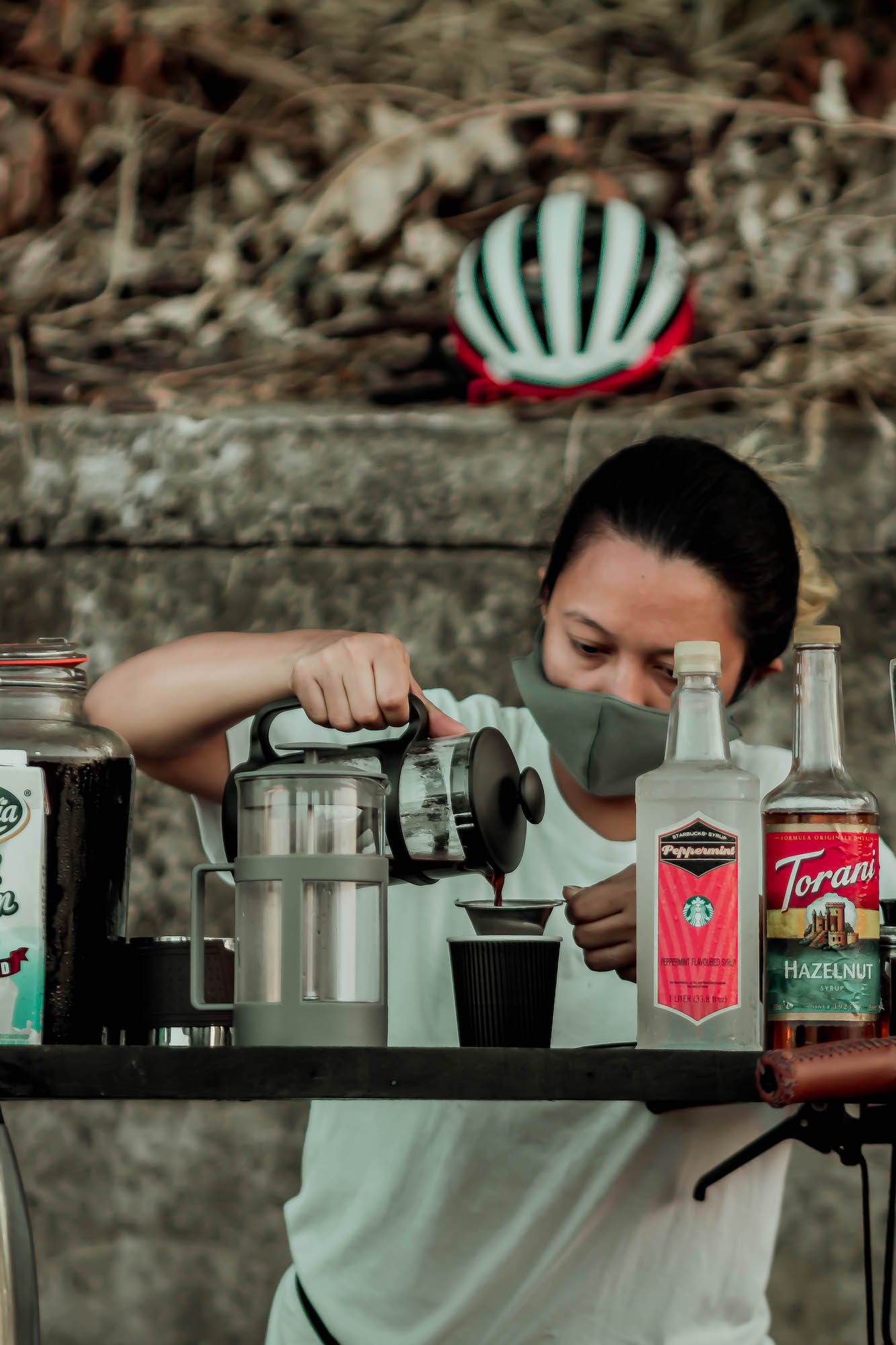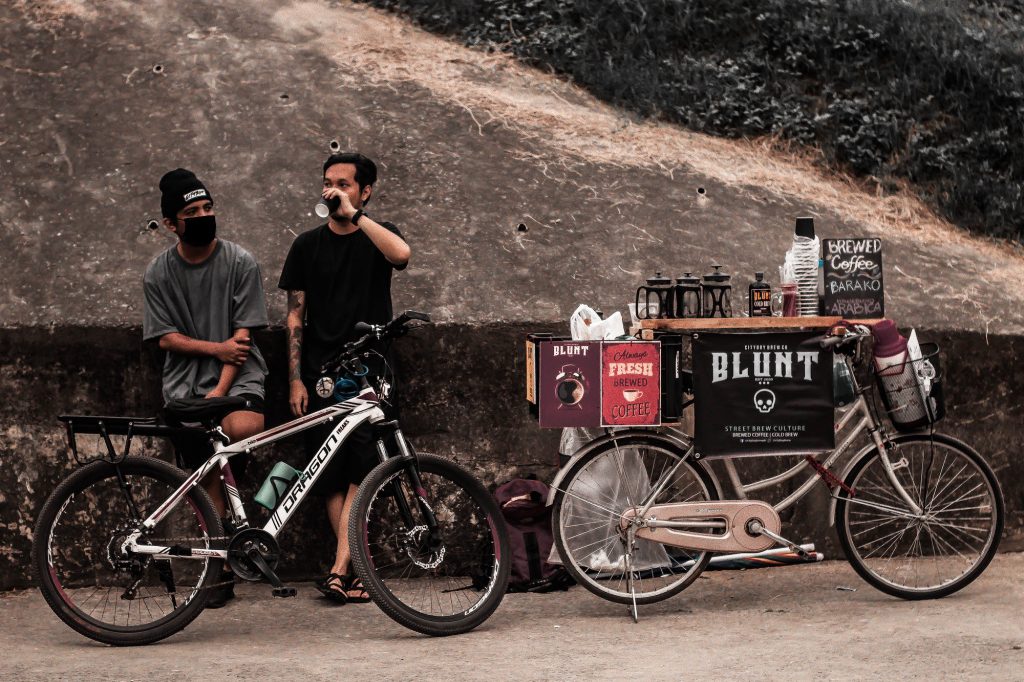Mong Vicente likes the smell of coffee.
Working as a freelance photographer, he acquired this fondness for the aroma when a client asked him to take photos of coffee beans for an online business last year. The scent hung heavy in the air and filled their home. With the addictive rich smell of coffee fascinating his olfactory, Vicente soon thought of it as a viable business.
At first, like many of the businesses that emerged during the pandemic, he started selling bottled cold brew coffee online late last year. However, the business didn’t perform as well as he wanted. Inspired by a Davao-based motorcycle cafe called The Mobile Café, Vicente decided to take his business out in the streets on his bike.
In the first two weeks, he biked along Marcos Highway but always went home empty-handed. He only had two customers then: his sibling and his friend.
The low sales turnout was not exactly unexpected. Mobile food sellers have always been an integral part of the Filipino public life. Picture manong fishball, good morning towel hanging on his shoulder, frying an assortment of balls on the portable stove of his cart. Or maybe imagine another guy peddling the intriguing pink iskrambol all around the barangay in the middle of a hot day. But freshly brewed hot coffee in the middle of a hot city? Maybe not.
“Noong ginawa ko ’tong concept na ’to, tinanong ko agad sarili ko na parang wala naman talagang gustong mag-kape sa naka-bike lang,” Vicente says. “Isa siguro sa reason ’yun kaya walang bumibili sa ’kin noon. Bago kasi sa paningin ng tao. Pero naniwala pa rin ako sa vision ko kaya hindi ako tumigil. Pinagtrabahuhan ko talaga para mapansin ng mga tao, especially brewed coffee ’yung tinitinda ko.”
(When I tried this concept, I asked myself if anyone would want to have coffee from just a bike. That might have been a reason why no one was buying from me then. It was new to people. But I believed in my vision, which is why I did not stop. I worked hard to get noticed by people, especially the brewed coffee I was selling.)


When Vicente stationed his bike at a regular spot along Marikina Riverbanks, Cityboy Brew found steadiness. To start, the venue allows mobile businesses like his to thrive. “Sarap kasi ng vibes doon parang sakto sa kape. Nasa concrete jungle kasi tayo, eh. Riverbanks lang ’yung may ganong setup na ilog ta’s mapuno sa gitna ng city, ‘di ba?” he says.
(There’s such a good atmosphere that it would feel good to have coffee. We are in a concrete jungle, and Riverbanks is the only place with that kind of setup by the river and with trees in the middle of the city.)
From the two cups he sold in the first two weeks of his operations, Vicente now sells 50 to 150 cups of coffee on weekdays. One time, on a weekend, he reached 486 cups in just six hours.
With a schedule of going out early in the morning and late afternoon, Cityboy Brew attracted more customers. From the two cups he sold in the first two weeks of his operations, Vicente now sells 50 to 150 cups of coffee on weekdays. One time, on a weekend, he reached 486 cups in just six hours.
As the season requires and the customers demand, Vicente also expanded his menu to include sweet and cold drinks.
The success of Cityboy Brew is no doubt a result of Vicente’s persistence and hard work not only in the hours he spends making coffee but also with marketing his business online. On Facebook, where the Cityboy Brew page has over 4,000 likes, Vicente regularly engages with the mobile café community. This is where he also updates his patrons on his operating hours—usually from 5 a.m. to 8 a.m. and 4 p.m. to 8 p.m. On top of that, Vicente attributes the triumph of Cityboy Brew to the support of his family and friends.


“[’Yung] family and friends na naniniwala sa kakayanan mo at nakasuporta lagi sa ‘yo, napaka-importante no’n. Isa o dalawang tao lang na sumuporta sa ‘yo sa journey mo, hinding-hindi ka na matatalo no’n,” he says.
(It is so important to have family and friends who believe in your abilities. You cannot lose even with just one or two people supporting you in your journey.)
It’s this spirit of camaraderie that also allowed Cityboy Brew to flourish and build a vibrant mobile food scene at the Riverbanks. Around March, Vicente encouraged his friends to join him and established a small community they call Cityboy Crew. Alongside Cityboy Brew, Escala offers shawarma and pastries. The Hungry Man, on the other hand, serves sausages. Like Cityboy Brew, both additions to the crew are also on bike.
Mobile businesses have become more present in recent months, especially bike cafes. As Vicente says, there’s a sense of novelty to the act of brewing on a bicycle. But as also mentioned earlier, our street culture has always been lively and innovative. Businesses on bikes have always been thriving in our streets. But with the drastic changes brought about by the pandemic, what they do now is bring a sense of familiarity to the public life.





